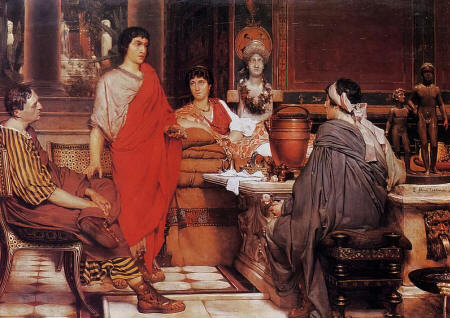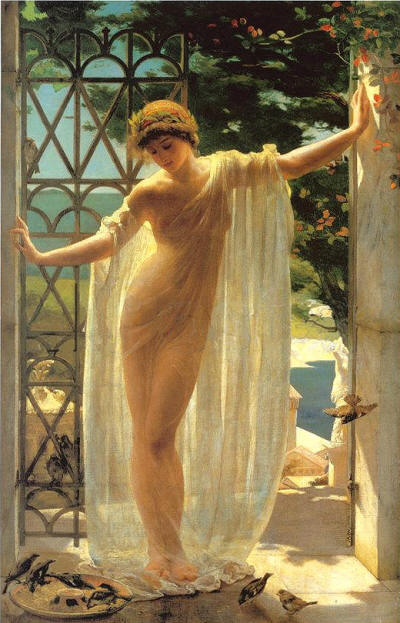 Gaius Valerius Catullus (/kəˈtʌləs/ kə-TUL-əs; Latin: [kaˈtʊllʊs]; c. 84 – c. 54 BC) was a Latin poet of the late Roman Republic who wrote chiefly in the neoteric style of poetry, which is about personal life rather than classical heroes. His surviving works are still read widely and continue to influence poetry and other forms of art.
Catullus's poems were widely appreciated by contemporary poets, significantly influencing Ovid and
Virgil, among others. After his rediscovery in the Late Middle Ages, Catullus again found admirers such as Petrarca. The explicit sexual imagery which he uses in some of his poems has shocked many readers. Yet, at many instruction levels, Catullus is considered a resource for teachers of Latin.[2] His profane body of work is still frequently read from secondary school to higher education programs across the world, with his 64th poem often considered his greatest.
Gaius Valerius Catullus (/kəˈtʌləs/ kə-TUL-əs; Latin: [kaˈtʊllʊs]; c. 84 – c. 54 BC) was a Latin poet of the late Roman Republic who wrote chiefly in the neoteric style of poetry, which is about personal life rather than classical heroes. His surviving works are still read widely and continue to influence poetry and other forms of art.
Catullus's poems were widely appreciated by contemporary poets, significantly influencing Ovid and
Virgil, among others. After his rediscovery in the Late Middle Ages, Catullus again found admirers such as Petrarca. The explicit sexual imagery which he uses in some of his poems has shocked many readers. Yet, at many instruction levels, Catullus is considered a resource for teachers of Latin.[2] His profane body of work is still frequently read from secondary school to higher education programs across the world, with his 64th poem often considered his greatest.
Some of his erotic poems (50 and 99) are about his homosexual desires and acts, but most are about women, especially about one he calls "Lesbia" (which served as a false name for his married girlfriend, Clodia, source and inspiration of many of his poems).
The American poet Louis Zokofsky in 1969 wrote an extraordinary set of homophonic translations of Catullus that attempted in English to replicate the sound as primary emphasis, rather than the more common emphasis on sense of the originals (although the relationship between sound and sense there is often misrepresented and has been clarified by careful study); his Catullus versions have had extensive influence on contemporary innovative poetry and homophonic translation, including the work of poets
Robert Duncan,
Robert Kelly, and
Charles Bernstein.

Lesbia, 1878 painting by John Reinhard Weguelin inspired by the poems of Catullus
My published books:


BACK TO HOME PAGE

 Gaius Valerius Catullus (/kəˈtʌləs/ kə-TUL-əs; Latin: [kaˈtʊllʊs]; c. 84 – c. 54 BC) was a Latin poet of the late Roman Republic who wrote chiefly in the neoteric style of poetry, which is about personal life rather than classical heroes. His surviving works are still read widely and continue to influence poetry and other forms of art.
Catullus's poems were widely appreciated by contemporary poets, significantly influencing Ovid and
Virgil, among others. After his rediscovery in the Late Middle Ages, Catullus again found admirers such as Petrarca. The explicit sexual imagery which he uses in some of his poems has shocked many readers. Yet, at many instruction levels, Catullus is considered a resource for teachers of Latin.[2] His profane body of work is still frequently read from secondary school to higher education programs across the world, with his 64th poem often considered his greatest.
Gaius Valerius Catullus (/kəˈtʌləs/ kə-TUL-əs; Latin: [kaˈtʊllʊs]; c. 84 – c. 54 BC) was a Latin poet of the late Roman Republic who wrote chiefly in the neoteric style of poetry, which is about personal life rather than classical heroes. His surviving works are still read widely and continue to influence poetry and other forms of art.
Catullus's poems were widely appreciated by contemporary poets, significantly influencing Ovid and
Virgil, among others. After his rediscovery in the Late Middle Ages, Catullus again found admirers such as Petrarca. The explicit sexual imagery which he uses in some of his poems has shocked many readers. Yet, at many instruction levels, Catullus is considered a resource for teachers of Latin.[2] His profane body of work is still frequently read from secondary school to higher education programs across the world, with his 64th poem often considered his greatest.

